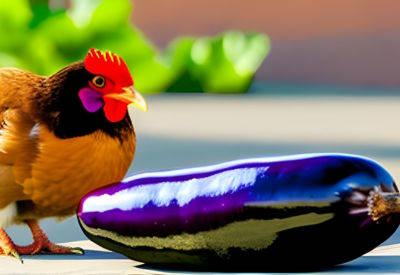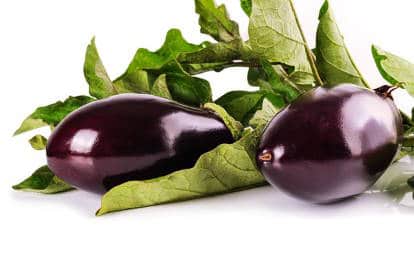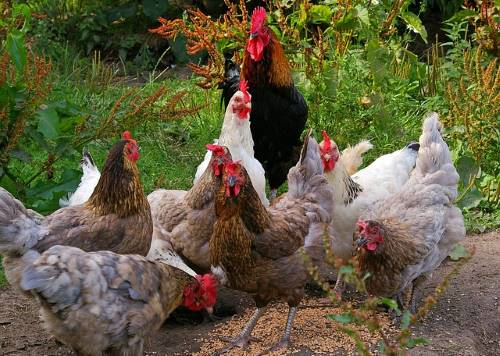As a fellow chicken owner, I’m sure you’ve wondered about the various fruits and vegetables that can be safely added to your chickens’ diet. We all want the best for our feathered friends, and providing them with a diverse and nutrient-rich diet is one way to ensure they lead happy, healthy lives. With that in mind, today we’re going to answer a question that might have crossed your mind: can chickens eat eggplant?
Eggplant is a versatile and nutritious vegetable that many of us enjoy in our meals, but is it also a good choice for our chickens? As a responsible chicken keeper, I’ve researched and am excited to share my findings. Together, we’ll explore the benefits of feeding eggplant to your chickens, the potential risks to be aware of, and how to properly prepare this vegetable for your flock.
In the following article, we’ll dive into the specifics of eggplant as a part of your chickens’ diet. We’ll cover topics such as the frequency at which you should feed them eggplant, how to prepare it, and whether baby chicks can enjoy this vegetable too. So, let’s embark on this eggplant adventure and discover how this humble vegetable can benefit our beloved chickens.

Can chickens eat eggplant?
So you’re wondering, can chickens eat eggplant? The answer is yes; chickens can eat eggplant without any issues. Eggplant is a nutritious vegetable that can be a great addition to your chicken’s diet. However, it’s important to feed eggplant in moderation and prepare it before offering it to your feathered friends.
Now, you might ask yourself, “Why is eggplant safe for chickens?” Eggplants are primarily composed of water, making them easy to digest. Additionally, they contain essential nutrients that can contribute to a chicken’s overall health. Just be sure to avoid any parts of the eggplant plant that may be toxic, like the leaves and stems.
It’s worth noting that chickens have different preferences when it comes to food, so your flock might not gobble up the eggplant right away. But don’t worry – this is completely normal. Like people, chickens have their own individual tastes, and it may take some time for them to become accustomed to the new vegetable in their diet.
[ChickenAffiliate]
The benefits of eating eggplant for chickens
Eggplant offers various benefits to chickens when included in their diet. Let’s take a closer look at some of the key advantages.
Rich in antioxidants
Eggplants are packed with antioxidants, such as nasunin and chlorogenic acid, which help neutralize harmful free radicals in the body. These antioxidants can support your chicken’s overall health and help boost its immune system.
High in dietary fiber
Eggplants are an excellent source of dietary fiber, essential for maintaining proper digestion in chickens. Fiber helps regulate bowel movements and promotes a healthy gut environment, which is crucial for nutrient absorption and overall health.
Contains essential vitamins and minerals
Eggplant is a good source of essential vitamins and minerals, such as vitamin K, B6, magnesium, and manganese. These nutrients play important roles in various bodily functions, like blood clotting, energy production, and bone health.
Low in calories
Eggplant is low in calories, making it an excellent option for chickens on a diet or those prone to obesity. It’s a great way to add variety to their meals without compromising their caloric intake.
Hydration
As mentioned earlier, eggplants have a high water content. Feeding your chickens eggplant can contribute to their hydration, especially during hot weather.
Things to watch out for when feeding eggplant to chickens

Feeding eggplant to your chickens can be beneficial, but there are a few things you should be aware of.
Toxic leaves and stems
Eggplant leaves and stems contain solanine, a toxic compound that can harm chickens. Make sure to remove these parts before feeding eggplant to your flock.
Pesticides and chemicals
If you’re not growing your eggplants, be cautious of pesticide and chemical residues on store-bought ones. These can harm your chickens, so washing the eggplant thoroughly or opting for organic options when possible is best.
Overfeeding
As with any other food, moderation is key when feeding eggplant to chickens. Overfeeding can lead to digestive issues and may disrupt the balance of nutrients in their diet.
How often should chickens eat eggplant?
While eggplant is safe for chickens to eat, it shouldn’t be the main component of their diet. Chickens require a balanced diet consisting primarily of high-quality poultry feed, which contains the right balance of nutrients needed for their health and productivity.
Eggplant can be fed to chickens as an occasional treat or supplement, about once or twice a week. This frequency will allow your chickens to benefit from eggplant nutrients while maintaining a balanced diet.
Remember, monitoring your chickens’ reaction to eggplant is essential, as some may not be as enthusiastic about it as others. Observe how your flock responds and adjust the feeding frequency accordingly.
How to prepare eggplant for feeding to chickens

Before you start feeding eggplant to your chickens, it’s crucial to prepare it properly. Here are some steps to follow.
Wash the eggplant thoroughly
As mentioned earlier, pesticide and chemical residues can be harmful to chickens. Make sure to wash the eggplant under running water, scrubbing the surface gently to remove any contaminants.
Remove the leaves and stems
Don’t forget to remove the toxic leaves and stems from the eggplant. This will help ensure the safety of your chickens and prevent any potential health issues.
Cut the eggplant into small pieces
Chickens don’t have teeth, so it’s important to cut the eggplant into small, manageable pieces that they can easily peck and swallow. This will also help prevent choking hazards.
Cook the eggplant (optional)
While raw eggplant is safe for chickens, you might find that some chickens prefer cooked eggplant. Cooking the eggplant can make it softer and easier to digest. You can steam, boil, or grill the eggplant without adding salt, oil, or seasoning.
Monitor the temperature
If you decide to cook the eggplant, let it cool to room temperature before serving it to your chickens. Hot food can scald their beaks or throats.
Mix with other treats
You can combine eggplant with other healthy treats, like fruits and vegetables, to make a more enticing meal for your chickens. Just remember to keep the portions in moderation.
Can baby chicks eat eggplant?
When it comes to baby chicks, it’s best to avoid feeding them eggplant. Baby chicks have different nutritional needs than adult chickens and require a specific diet for optimal growth and development.
During the first few weeks of life, baby chicks should be fed a high-quality starter feed specifically formulated for their needs. This feed contains the right balance of nutrients, like protein, vitamins, and minerals, to support their rapid growth.
Once the chicks are around 6 to 8 weeks old, you can start introducing small amounts of vegetables, like eggplant, into their diet. However, always prioritize their primary feed and monitor how they react to the new food.
What other vegetables can chickens eat apart from eggplant?

Eggplant is a fantastic addition to your chickens’ diet, but numerous other vegetables can give them essential nutrients and keep their meals interesting. Here are five more vegetables that can be safely fed to your chickens and the benefits of these tasty treats for your flock!
Okra
Okra is a nutritious vegetable that can be a great treat for your chickens. It is packed with vitamins A, C, and K and essential minerals like calcium, magnesium, and potassium. These nutrients help support your chickens’ immune system, bone health, and overall well-being. Additionally, okra is high in dietary fiber, which aids digestion and promotes a healthy gut environment.
Read More: Can Chickens Eat Okra? 5 Important Benefits
Corn on the cob
Chickens love corn, and feeding them corn on the cob can be a fun and entertaining way to provide them with a nutritious treat. Corn is an excellent carbohydrate source, providing energy for your chickens to stay active and healthy. It also contains essential nutrients like vitamin A, thiamine, and niacin, which support various bodily functions. Be sure to offer corn on the cob in moderation, as too much can lead to an imbalanced diet.
Read More: Can Chickens Eat Corn On The Cob? 5 Excellent Benefits
Pickles
Pickles, or pickled cucumbers, can also be fed to chickens in moderation. Although high in sodium, they contain small amounts of vitamins and minerals that can contribute to a chicken’s overall health. The acidic nature of pickles can help support a healthy gut environment, but it’s important not to overdo it. Always opt for low-sodium pickles and offer them as an occasional treat to avoid potential health issues.
Read More: Can Chickens Eat Pickles? 4 Awesome Benefits
Artichokes
Artichokes are another nutritious vegetable that can be fed to chickens. They are high in antioxidants, which help protect cells from damage caused by free radicals and are also rich in dietary fiber, supporting proper digestion. Artichokes contain essential nutrients like vitamin C, potassium, and magnesium, contributing to your chickens’ overall health. Make sure to cook and cut the artichokes into small pieces before feeding them to your flock.
Read More: Can Chickens Eat Artichokes? 5 Important Benefits
Yams
Yams are a tasty and nutritious treat that chickens can enjoy. Rich in complex carbohydrates, they provide a good energy source for your flock. Yams also contain essential nutrients like vitamins A, C, and manganese, which help support various bodily functions, including immune system health and bone development. Cooked, mashed, or cut into small pieces, yams can be a delicious and healthy addition to your chickens’ diet.
Read More: Can Chickens Eat Yams? 4 Fantastic Benefits
By incorporating these five vegetables into your chickens’ diet, along with eggplant, you can provide a diverse and nutrient-rich menu that keeps your flock healthy and happy. Remember to feed them in moderation and always prioritize their primary poultry feed.
Can chickens eat eggplant – final thoughts
So there you have it, fellow chicken enthusiasts! We’ve cracked the eggplant mystery, and the answer is yes, chickens can eat eggplant. Not only is it a safe option for our feathered friends, but it also offers a variety of health benefits like antioxidants, dietary fiber, and essential vitamins and minerals. Remember that moderation is key, and eggplant should be fed to your flock as an occasional treat, complementing their primary poultry feed.
Preparing eggplant for your chickens is a breeze, too. Simply wash it, remove the toxic leaves and stems, and cut it into small, bite-sized pieces. You can even cook or mix it with other healthy treats to create a delicious and nutritious feast for your flock. As for baby chicks, it’s best to stick to their specific starter feed until they’re old enough to safely try eggplant and other vegetables.
In summary, eggplant can be a wonderful addition to your chickens’ diet, providing valuable nutrients and a refreshing change of pace from their regular meals. As responsible chicken keepers, we always strive to offer our flock the best possible care, and including eggplant in their diet is just one of the many ways we can ensure their well-being. So go ahead and treat your chickens to some delicious eggplant – they’ll surely cluck their appreciation!
